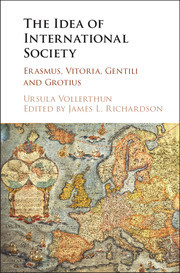Description
The Idea of International Society
Erasmus, Vitoria, Gentili and Grotius
Authors: Vollerthun Ursula, Richardson James L.
The first comprehensive account of the initial development of the 'Grotian tradition' in international relations theory, reaching entirely unexpected conclusions.
Language: English
Subject for The Idea of International Society:
Approximative price 39.35 €
In Print (Delivery period: 14 days).
Add to cart
The Idea of International Society
Publication date: 01-2020
Support: Print on demand
Publication date: 01-2020
Support: Print on demand
Approximative price 107.81 €
In Print (Delivery period: 14 days).
Add to cart
The Idea of International Society
Publication date: 08-2017
264 p. · 15.6x23.5 cm · Hardback
Publication date: 08-2017
264 p. · 15.6x23.5 cm · Hardback
Description
/li>Contents
/li>Biography
/li>
This book offers the first comprehensive account and re-appraisal of the formative phase of what is often termed the 'Grotian tradition' in international relations theory: the view that sovereign states are not free to act at will, but are akin to members of a society, bound by its norms. It examines the period from the later fifteenth to the mid-seventeenth centuries, focusing on four thinkers: Erasmus, Vitoria, Gentili and Grotius himself, and is structured by the author's concept of international society. Erasmus' views on international relations have been entirely neglected, but underlying his work is a consistent image of international society. The theologian Francisco de Vitoria concerns himself with its normative principles, the lawyer Alberico Gentili - unexpectedly, the central figure in the narrative - with its extensive practical applications. Grotius, however, does not re-affirm the concept, but wavers at crucial points. This book suggests that the Grotian tradition is a misnomer.
1. Three ways of thinking about international relations; 2. Desiderius Erasmus of Rotterdam; 3. Francisco de Vitoria; 4. Alberico Gentili; 5. Hugo Grotius; 6. Conclusion.
Ursula Vollerthun (1937‒2011) came relatively late to International Relations. With a background in Political Science and the History and Philosophy of Science, she pursued the present topic for her thesis in the Department of International Relations in the then Research School of Pacific Studies at the Australian National University.
James L. Richardson was Professor of Political Science (1975‒85), later of International Relations (1986‒98), at the Australian National University, Canberra. He is author of Germany and the Atlantic Alliance (1966), Crisis Diplomacy (Cambridge, 1994) and Contending Liberalisms in World Politics (2001). After Ursula Vollerthun's death, he devoted himself to this work.
James L. Richardson was Professor of Political Science (1975‒85), later of International Relations (1986‒98), at the Australian National University, Canberra. He is author of Germany and the Atlantic Alliance (1966), Crisis Diplomacy (Cambridge, 1994) and Contending Liberalisms in World Politics (2001). After Ursula Vollerthun's death, he devoted himself to this work.
© 2024 LAVOISIER S.A.S.



